There’s a lot to consider when choosing the best CRM software for manufacturing businesses.
First, you should understand the specific needs of your industry.
For example, let’s say you manufacture a product that calls for multiple touchpoints in the customer journey. In this instance, you’d need a CRM with features specifically tailored to customer service and management.
But you also want to ensure that your manufacturing industry CRM is easy to use and personalizable.
Finding a CRM for manufacturing industry that grow with your company is also important.
Throughout this article, you’ll understand how CRM systems stimulate growth in manufacturing.
And to help you make the right decision, we’ve compiled a list of the top 9 best CRM software for manufacturing industry in 2024.
What’s a CRM?
A CRM, or customer relationship management system, is software that helps businesses manage customer interactions and data.
The primary purpose of using a CRM system is to nurture relationships with current and potential customers throughout the buyer’s journey.
A CRM for manufacturing industry gives you a complete view of your customers by tracking all interactions in one place.
You can use this valuable customer data to improve marketing strategies, sales processes, product development, and overall operations.
What’s a CRM for manufacturing industry?
Using CRM in manufacturing industry is known to increase sales and ROI while reducing customer churn rates.
A CRM solution for the distribution and manufacturing industries helps businesses manage customer relationships and data in a way that’s tailored to their needs.
Some of the most popular features in a manufacturing industry CRM include:
- Quoting and pricing.
- Opportunity management.
- Customer portals.
The best CRM software for manufacturing helps you increase customer engagement, boost sales, and improve customer support and marketing strategies.
What are the main features to look for in a CRM for manufacturing?
Now that you’ve learned about the use of CRM in manufacturing industry let’s take a closer look at the features that most manufacturers look for.
When choosing a CRM solution for the distribution and manufacturing industries, prioritize the following.
1. Configurability
Configuring the software to your company’s specific needs is a critical part of a manufacturing industry CRM.
You want to be able to adjust workflows, create custom fields, and add or remove functionality as needed. The more you can mold your CRM software to your business, the better.
2. Customization
Once you’ve found a configurable CRM, you’ll want to ensure it’s also customizable. This means being able to personalize the user interface (UI) and user experience (UX) to fit your company’s needs.
You should be able to change things like colors, fonts, and logos. The best CRM for manufacturing industry let you create custom reports and dashboards too.
3. Integrations
Integration is one of the most critical features to look for in a CRM for manufacturing industry.
Ideally, you should choose a solution that integrates with the rest of your manufacturing software stack.
Examples of valuable integrations include your accounting software like QuickBooks or email campaign manager.
Why should you use a CRM for manufacturing
There are many reasons to use a CRM system in any industry, but the benefits are especially pronounced in manufacturing.
For one, the best CRM for manufacturing help you increase sales by improving your marketing and sales processes.
You can use your CRM to automatically send targeted emails to customers based on their interactions with your company. You can also segment your customer list so that your sales team only contacts the most qualified leads.
With a manufacturing CRM, you can offer your customers a portal where they can:
- View their purchase history.
- Track their orders.
- Submit support tickets.
Below is an example of what a portal from a CRM for manufacturing industry offers.
Let’s review how your business can benefit from a dedicated manufacturing industry CRM.
How can I benefit from using a CRM for manufacturing?
If you’re still not convinced that a CRM system is right for your manufacturing business, consider the following benefits.
1. Improved customer engagement
CRM systems give you complete visibility into your customer interactions and data. You can use this valuable information to improve marketing strategies and sales processes.
2. Increased sales and ROI
A CRM solution for manufacturing helps you increase sales and ROI while reducing customer churn rates.
3. Boosted productivity
The use of CRM in manufacturing industry lets you boost productivity by automating repetitive tasks such as email marketing or lead generation.
4. Better forecasting and planning
CRM systems make it easier to forecast future sales and marketing trends. You can use this information to improve product development or operations.
5. Informed decision-making
A CRM system provides managers with valuable data that they can use to make informed decisions about marketing, sales, and operations.
How can I choose the best CRM for my manufacturing industry?
Now that you know the benefits of using a CRM system in manufacturing, let’s look at how to choose the best CRM for your business.
There are many different types of CRM solutions on the market, so choosing one that can be tailored to the manufacturing industry is essential.
You have learned that configurability, customization, and integrations are the three main things to watch out for. But what else do you need to know?
To help you find your perfect fit, below are the best CRM software for the distribution and manufacturing industries.
How we selected the best CRMs for manufacturing industry
When putting together this list, we looked at various factors, including:
- Configurability.
- Customization.
- Integrations.
- Other key features.
We also considered user reviews of these CRM systems from reputable sources such as Capterra and G2 Crowd.
From our research, we were able to narrow down the list to the top 10 best CRM software for manufacturing industry.
Best CRM software for manufacturing in 2024
Compare the best CRM software for manufacturing in 2024 with this comprehensive list of features, pros, cons, and pricing details.
1. Method CRM
Features
- QuickBooks and Xero two-way sync, so your financials are always up to date.
- Online customer portal for an improved customer experience.
- Mobile app to keep you in the loop anytime, anywhere.
- Custom reporting based on your business needs.
- Native integrations with Gmail, Outlook, Mailchimp, Zapier, and more.
Pros
- Save time and enhance accuracy when you sync customer data between Method and QuickBooks or Xero.
- Reusable templates to personalize emails, reports, invoices, estimates, and more.
- No code, unlimited customization to create a tailored solution.
- The ability to automate your business all around.
Cons
Method CRM is currently only available in English to users of QuickBooks or Xero.
Pricing
Method CRM offers three subscription options:
- Contact Management: $25 per user per month.
- CRM Pro: $44 per user per month.
- CRM Enterprise: $74 per user per month.
Method CRM also offers a free trial, no credit card required.
2. Zendesk Sell

Features
- Email integrations.
- Sales engagement tools.
- Task overview.
- Call and text log.
Pros
- Useful reporting options.
- Easy onboarding and team creation.
- Smart list generation through filtered data.
Cons
Some users have reported a lack of customization and limitations with the pipeline.
Pricing
Zendesk Sell has three subscription options:
- Team: $19 per user per month.
- Growth: $49 per user per month.
- Professional: $99 per user per month.
Zendesk Sell offers a 14-day free trial.
3. Thryv (previously LeadMaster)
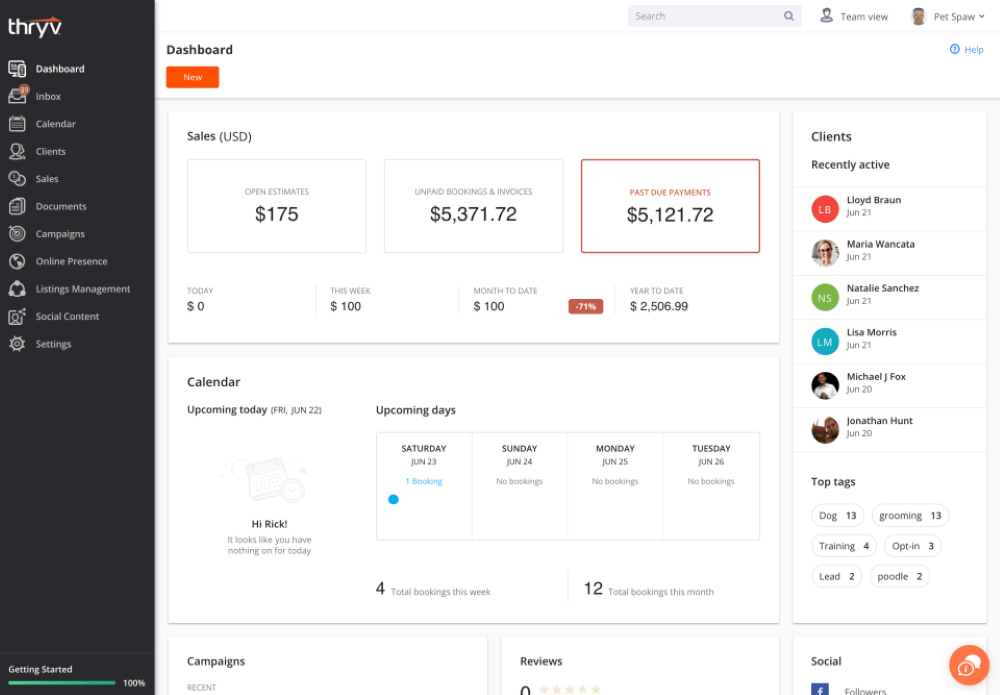
Features
- Job scheduling.
- Billing and invoicing.
- Marketing automation.
Pros
- Centralized tools for different business needs.
- Quick and helpful customer service.
- Customer engagement across channels.
Cons
Some users have reported a steep learning curve in the beginning. A lack of automation surrounding billing and invoicing is another limitation of this CRM for manufacturing industry.
Pricing
Thryv offers three subscription plans:
- Plus: 2 users.
- Premium: 6 users.
- Unlimited: 10 users.
Pricing is calculated on a custom proposal basis so there are no preset pricing points listed online.
4. Maximizer CRM
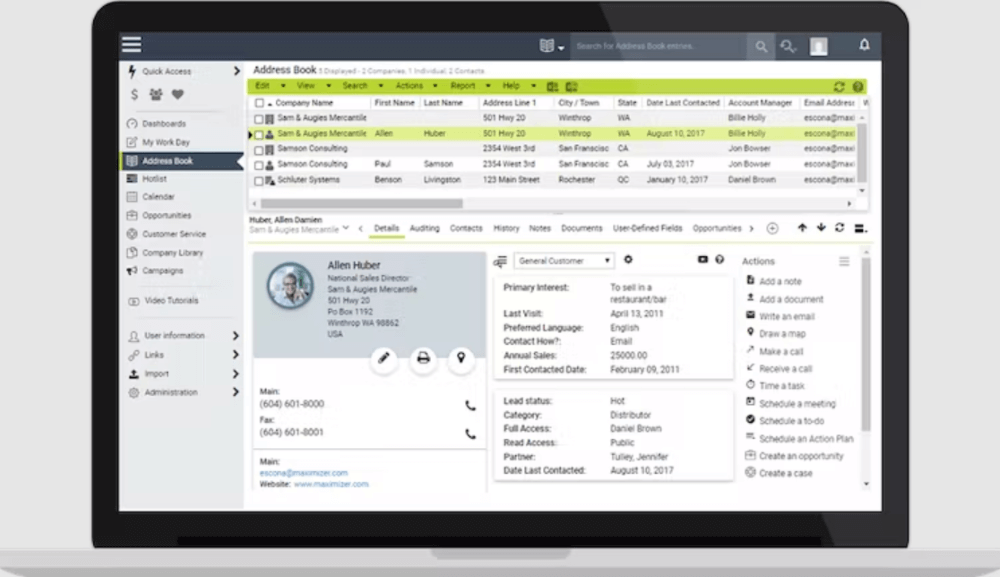
Features
- Knowledge base management.
- Support ticket management.
- Goal setting/tracking.
Pros
- Centralized sales data.
- Ongoing sales team improvement.
- Informed decision-making through customized reporting.
Cons
Users reported limited capacities, so it’s not a scalable solution. There have also been issues with syncing integrations.
Pricing
Maximizer offers three subscription plans:
- Small Office: $35 per user per month.
- Business: $55 per user per month.
- Professional: $100 per user per month.
5. NetSuite CRM
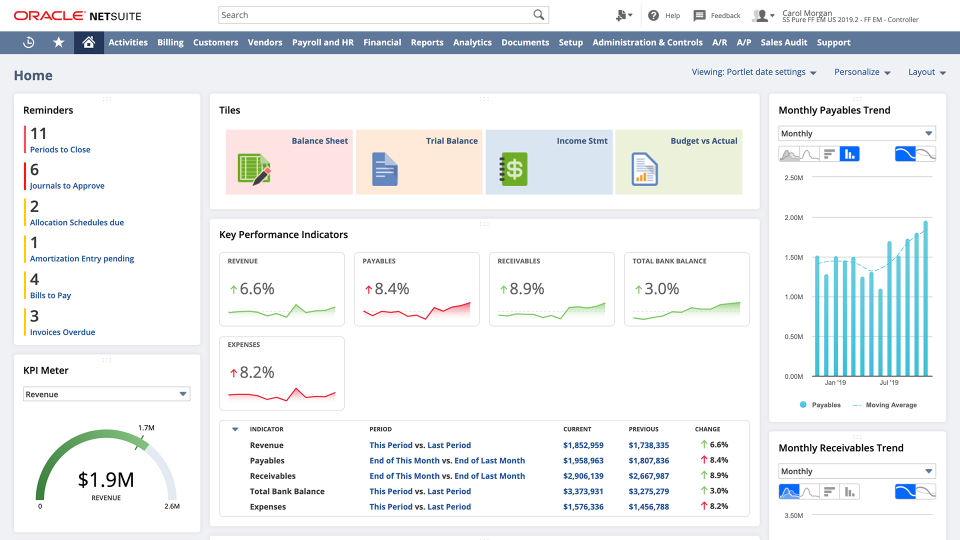
Features
- Marketing automation.
- Customer service management.
- Partner relationship management.
Pros
- Centralized view of customer data.
- Visibility into sales pipeline and forecasts
- Streamlined marketing campaign management.
Cons
Not very user-friendly, so third-party integration can be challenging without a specialized support team. Many users have reported a steep learning curve.
Pricing
Pricing for this CRM for manufacturing industry is calculated on a custom basis.
6. Insightly
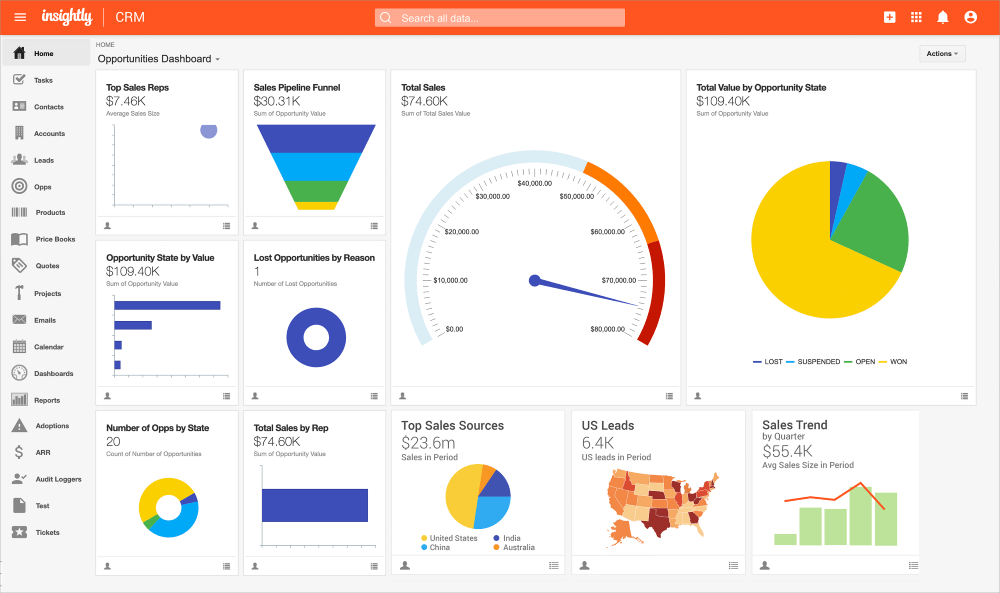
Features
- Lead routing.
- Advanced project management.
- Built-in phone feature.
- Integrations with over 250 apps.
Pros
- Business cards easily scanned on mobile app.
- Easy conversion of won opportunities into projects.
- Customizable fields to control how you capture data.
Cons
Insightly does not offer strong reporting. Customization is also limited, giving you only a high-level view of your business.
Pricing
Insightly offers three subscription plans:
- Plus: $29 per user per month.
- Professional: $49 per user per month.
- Enterprise: $99 per user per month.
Insightly does not offer a free trial. The free plan has minimal features and only allows for two users.
7. Claritysoft CRM
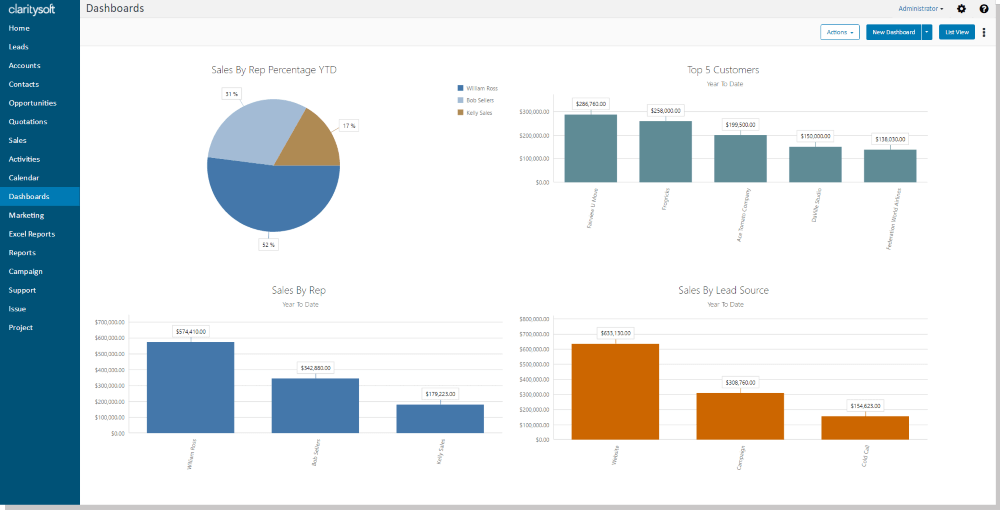
Features
- Email marketing.
- Contact and sales management.
- Reporting and dashboards.
Pros
- Easy to customize.
- Powerful email integrations.
- Pipeline management automation.
Cons
Some of the most important features like workflow automation are not available in the lowest price tier. Some users have also reported glitches and slow speeds when running the software.
Pricing
Claritysoft offers three subscription plans:
- Professional: $39 per user per month.
- Accelerator: $49 per user per month.
- Enterprise: $69 per user per month.
There is a 3-user minimum for any subscription.
8. SugarCRM
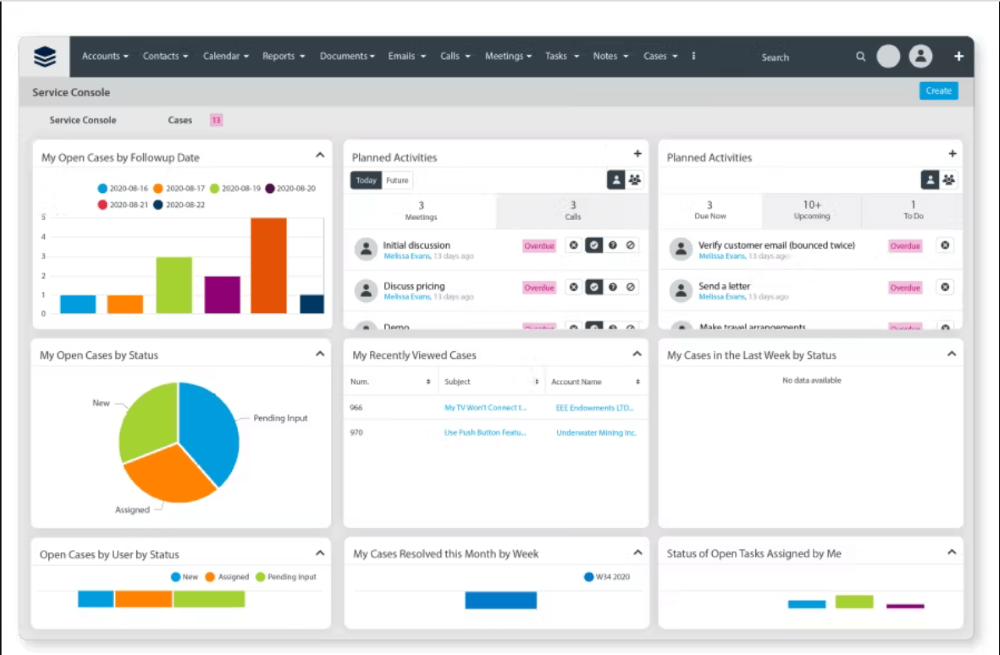
Features
- Quote management.
- Sales forecasting.
- Reporting and dashboards.
- Mobile app.
Pros
- Intuitive marketing automation tools.
- Affordable solution for small businesses.
- Useful third-party integrations.
Cons
Some users have expressed difficulties navigating the interface and customizing the platform.
Pricing
SugarCRM offers four subscription plans:
- Sell: $49 per user per month.
- Serve: $80 per user per month.
- Enterprise: $85 per user per month.
- Market: $1,000 per month for 10K contacts.
9. monday sales CRM
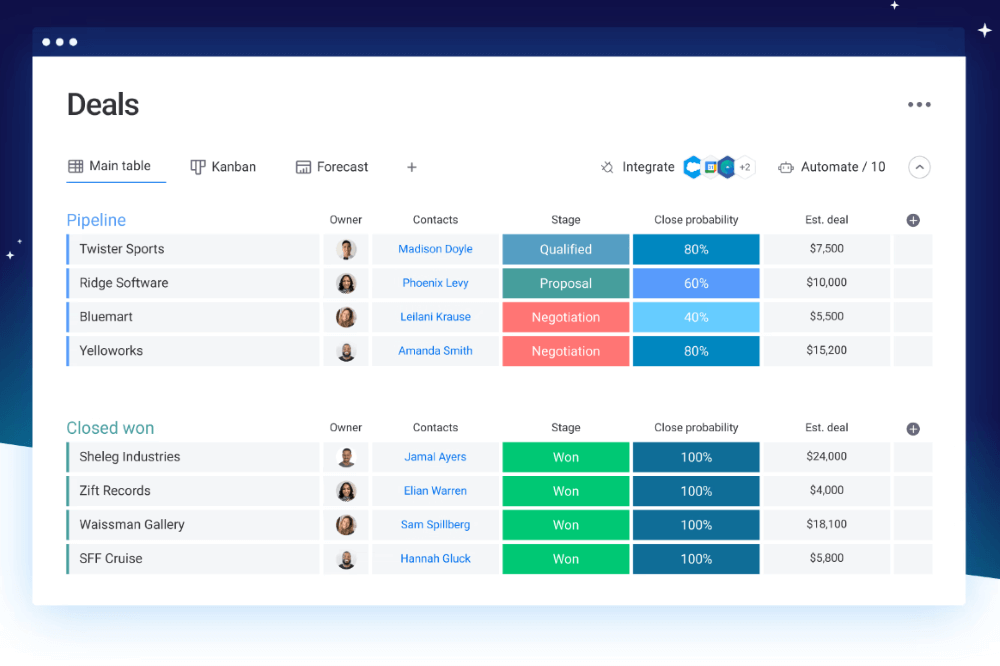
Features
- Contact and lead management.
- Sales pipeline and forecasting.
- Marketing automation.
Pros
- Easy to personalize.
- Intuitive user interface.
- Great for collaboration and building engagement.
Cons
The platform lacks a good reporting feature and popular email integrations.
Pricing
Monday sales CRM offers five subscription plans:
- Individual: $0, up to two users.
- Basic: $17.30 per user per month.
- Standard: $23.60 per user per month.
- Pro: $40.20 per user per month.
- Enterprise: Custom pricing.
You can try the first four plans with a free 14-day trial.
CRM for manufacturing FAQs
Now that you’re equipped with all the knowledge necessary to pick your best CRM software for manufacturing.
Let’s take a look at some other frequently asked questions.
Does Salesforce provide a CRM for manufacturing industry?
Yes and no. Salesforce does not have a specific CRM solution for the manufacturing industry.
However, automotive, aerospace and defense, consumer goods, electronics, and more manufacturing industries have turned to Salesforce with success.
However, it may not be the best CRM for manufacturing small businesses due to the complexity of the tool.
You can see how Salesforce compares to Method, for example, as a CRM for manufacturing industry here.
What are the 3 types of CRM?
The three types of CRM are operational, analytical, and collaborative.
- Operational CRM automates and manages the sales process from beginning to end.
- Analytical CRM provides data-driven insights to improve marketing and sales strategies.
- Collaborative CRM facilitates communication and collaboration between different departments in a company.
What industries need CRM?
Any business that relies on sales coming in can benefit from a CRM system. This includes, but is not limited to, manufacturing, wholesale, healthcare, technology, consulting, and financial services.
Get started with a free trial of Method CRM!
Photo credit: cottonbro via Pexels.






